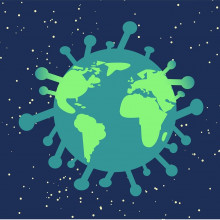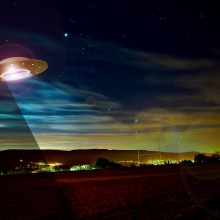Also in the news, boys vocalise more in their first year, NASA' holds a public meeting on the study of 'unitdentified aeriel phenomena', and what damage might a time traveller cause?
In this episode

00:55 - Psychedelics for depression making a comeback
Psychedelics for depression making a comeback
David Nutt, Imperial College London
Could ecstasy and LSD be used as potential treatments for depression? Speaking at the Hay Festival alongside the UK government’s former chief scientific adviser, Sir Patrick Vallance, Kate Bingham, who led the UK’s Covid vaccine task force, told the audience about evidence suggesting that psychedelic drugs can help people who suffer from some mental health problems. Patrick Vallance said it’s imperative that more research is done. Professor David Nutt is a neuropsychopharmacologist, former government drug “Tsar”…
David - Well, I was grateful that they've actually owned up to what we've known for quite a long time, that there is a major mental health crisis in this country, that current treatments are failing up to 40% of people, and that psychedelics and MDMA do have a very strong evidence base. I was heartened that, at last, people outside of the field are getting interested in and promoting it.
Chris - Both agents are not new. MDMA was made by Merck around the time of World War I - that's ecstasy - and LSD came along a few decades after that. So they're not new drugs. So is this a new use for old drugs or have they been tried in this space before, dismissed because we had better stuff and now we're revisiting them? What's the story behind this?
David - Well, the story is one of what I call the worst censorship of research in the history of the world. These drugs were banned because they were being used recreationally. But the bans were particularly hostile because they banned them as medicines. Even though there was considerable evidence, particularly for LSD (1000 papers published on the clinical value of LSD in the fifties and sixties.) But when it was banned because it was seen to be fueling the anti-Vietnam War movement, they banned it as a medicine as well, which was reprehensible and spiteful. And it has taken us 50 years now, we still haven't overturned the ban, but at least we've got people to accept it is a medicine again.
Chris - What's the evidence base that it can work in people who have particularly intractable depression and things like that?
David - Well, I'm proud to say, it's evidence that we've started to generate at Imperial College. We did the first modern trial of a psychedelic, psilocybin, and people with treatment resistant depression, they'd all failed on these two antidepressants, they'd all failed on CBT, and we had remarkable effects. We had the most powerful effect of a single administration of any treatment in resistant depression there's ever been. And that's led to a lot of companies going off to try to replicate it. And one has already done that. So we probably have a thousand patients now around the world who've shown remarkable benefits just to psilocybin alone. And that evidence base was sufficient for the Australian government a couple of months ago to agree that psilocybin will be rescheduled for treatment resistant depression as a medicine in Australia at the end of this month.
Chris - And those effects aren't just while the person's taking the agent, presumably there is a legacy benefit after the acute effects of the drug - I don't want to say wears off - but you take the drug, you get some more mood altering effects acutely, but then there's a mood altered effect that persists?
David - In our first study, which was 10 years ago, there are some people who well still. The vast majority of the depression creeps back as it does tend to in most people. But we still had very powerful effects, more powerful than any other treatment at six months. So yes, a single administration of these drugs can lead to very long lasting benefits.

06:44 - International pandemic treaty penned by WHO
International pandemic treaty penned by WHO
Anjana Ahuja, Financial Times
The World Health Organization wants to ensure the mistakes that turned Covid-19 into a global crisis won’t be repeated. It’s with this in mind that the UN body has been working on an international treaty setting out a joined up strategy we all follow to tackle future pandemics. But critics - including some right-wing MPs here in the UK - say a new agreement could give the WHO too much power - which might allow decision-makers in Geneva to implement lockdowns.
Anjana - What was really interesting about it was that it really was a pandemic that stopped the world. And the thing that got us out of it was vaccines, other countermeasures like drugs and so on. But we also had the terrible experience of lockdowns, global supply chains being disrupted, overwhelmed hospitals. It's been a learning experience, I would say. And also I think it taught us that a coordinated response, both within countries and internationally, would benefit us in the pandemics that are, I'm pretty sure, still to come.
Chris - One commentator put it to me, right at the beginning, that almost a bigger threat than the virus itself was the contagion of misinformation. And she was absolutely right. In many respects, we have repeatedly seen reports that we've been misled, many times in some cases, by governments. In some cases by social media clap trap, but misinformation has certainly prominently featured.
Anjana - What was really interesting in the early days actually was the World Health Organisation saying that we weren't just dealing with an epidemic, we were also dealing with an "info-demic." That's really a new phenomenon given the rise of social media, the ease with which people can access multiple sources of news which are not always verified. And what really surprised me was how influential some of those channels became - for example, the supposed link between Coronavirus and 5G. And I think when you have this very febrile atmosphere where you had governments suddenly telling people what to do, telling them to stay inside their homes, people were scared. And I think those are the very difficult high pressure situations where misinformation can flourish.
Chris - The other problem we encountered was that there was very much a "me too" mentality, which was being used as a stick to beat policymakers. You'd see one country doing one thing, and it might be a bit more vigorous than another although we didn't know better, governments were then being held to account: "they're doing this, why are we not doing that?" It seemed like there was a race to see who could be most strict at certain points in the pandemic led by very vocal individuals fueled by social media.
Anjana - You are right. In terms of lockdowns, we know that they are bad for many, many groups in society. They curtail our freedoms in a way that nobody ever wants. And I think they're very much seen as failures by public health. If you have to lock down, it means you haven't really implemented effective infection control measures beforehand. So we had this lurch, didn't we, from libertarianism, 'keep everything open', to lockdowns. But I think in terms of our learning, what does it mean now? I think everyone should be questioning having to take these drastic actions. What can we do before then to stop epidemics getting to that stage? What can we do in surveillance? What can we do to nip these things in the bud at a much earlier stage.
Chris - In that respect though, the World Health Organisation are now in the throes of drawing together international treaties with people signing up to try to come up with some kind of consensus so that there is less beating about the bush, "me too" thinking and disorganisation which is what was dominating some of the early responses to the pandemic. What are they actually advocating for and do you think that it's realistic?
Anjana - The treaty goes back to March 2021 when we put ourselves back at that time, and it's very hard to do that now. Everyone thought "never again." The world was so disrupted, and so global leaders, including Boris Johnson, came together. They all put their names to a document that said, we're going to go for this treaty. And the words were that no single government or multilateral agency can address this threat alone. And the idea, I think, was to look back on some of the things that were real sticking points in the pandemics; how do we share data? You've got the current controversy over the origins of Covid 19, how do we go into labs and know what's happening? How do vaccines get made and produced in a way that suits everybody? And how does personal protective equipment get distributed? So that's what the treaty is meant to do, to try to have a slightly more coordinated international effort to a future pandemic response. The sticking points, bearing in mind that the WHO doesn't have the powers to march into countries or compel them to do anything, are things like; what qualifies as a pandemic? How does the treaty fit in with the existing regulations? What principles is it trying to uphold? Trying to protect sovereignty of countries to transparency, how do you get the global supply chain to work and who pays for pandemic preparedness and response, for example? There is supposed to be agreement by 2024. I think many people see that as quite ambitious.
Chris - A chain is only as strong as its weakest link, though. And the weak link here in terms of cooperation, collaboration, transparency is the country where it was first detected and where it might... - we've had George Gao, the former CDC lead in China now admitting that it could well have begun in China, we just don't know - but China remain that weak link. They don't seem to cooperate. So are we really beating our heads against the wall with this? We'll all sign up to this with all good intentions, but the weak link remains?
Anjana - In terms of the treaty itself, multiple global leaders have signed up to it very enthusiastically, or at least signed up to a version of it. We'll have to wait and see what happens with China and how the future investigation into the origin of Covid play out. Countries have sovereignties, but they also have leaky borders. So what one country does will affect their neighbors. These are really, really tricky conversations. But I think any modern concept of geopolitics has to include pandemics and how we deal with health threats now because we've seen how bad things can get.

14:34 - Boys produce more speech in their first year
Boys produce more speech in their first year
Kim Oller, University of Memphis
The unmistakable noise of a young child trying to talk. But, somewhat surprisingly, researchers at the University of Memphis say that boys are more likely to produce these speech-like vocalisations in their first 18 months than girls, and it’s all to do with boosting their survival rates. Kim Oller is a professor at the University of Memphis and is behind the study, which happened almost by accident…
Kim - We didn't know that we were going to be interested in studying sex effects. We gathered data on early vocal development and we happened to have lots of boys and girls. And just by chance almost, ran an analysis comparing the boys and the girls. We were surprised to find that the boys were actually vocalising more than the girls in the first year. And the reason that's a little surprising is that there is a very widespread belief that females have an advantage in language. And so we had thought if there would be a difference between boys and girls, that the girls would be favoured and they weren't.
Chris - Of course there's a difference between vocalisation and language. So is there a distinction there in your study? Boys make noise, but it's the girls that later maybe emerge as the the stronger linguists?
Kim - Yeah, that's a good point. All that we see in the first year in these vocalisations we think of as precursors to speech is an emerging capacity and inclination to use the voice.
Chris - How did you get this data? I know you said this was opportunistic, but how did you come by all these recordings in the first place and how many recordings did you have?
Kim - 450,000 hours of recording. And the way I got in contact with it was through an organisation that I've been working with for almost 20 years now. It's called the LENA Foundation. They've produced a recording system, a little iPod size recorder, that you can put in the vest of a child's t-shirt and it will record all day long what the baby does. And they have also developed a way of using automated analysis so that they can count the number of vocalisations the babies are producing and they can count the number of what we call conversational turns, times when the baby says something and someone else says something within five seconds of that. So we acquired these data by automated analysis of these 450,000 hours of recording.
Chris - Let's break it down a bit then. So who was saying what at what age and how did the boys and girls differ?
Kim - What we're interested in, of course, is the sounds that are actually thought to be precursors to speech. Those were produced at rates of two to three per minute, and that's true of both boys and girls, except that the boys are 9 to 10% more vocal than the girls in the first year.
Chris - And is that the crossover point where the girls begin to take over? At the one year point? The boys dominate for that first year, and then there's a switchover?
Kim - In this particular study we saw the girls begin to show a significantly larger rate of vocalisation by about 18 months, something like that. So it's towards the end of the second year that the girls finally take over.
Chris - Was that interaction drive? Can your recordings reveal whether it's just that the parents are chattier with the girls, perhaps because they do something that solicits that chattiness and that elicits the response from the baby girls more than the boys? Or was this just spontaneous vocalisation that dominated in the boys for the first 18 months and then switches into a female dominated picture after that?
Kim - It should be clarified that the data showed that people were talking in the neighbourhood of the girls more often than the boys across the whole two year period. So the tendency for boys to be more vocal did not correspond to a tendency for parents to talk more in their neighbourhood in the first year. Now, as for why it would be that the boys would show more vocalisation in the first year, we think that's associated with the tendency of boys to be more vulnerable to dying in the first year than girls are now. This appears to be pretty much universal in humans. Boys are just more fragile in some ways, presumably because of immunological differences between boys and girls dying in the first year, and the rate of death of infants in the first year is much higher than it is in subsequent years. Consequently, we think that the rate of vocalisation that boys are producing in the first year being higher than girls in the first year has to do with the fact that they are signalling their wellness with vocalisation and in some sense eliciting more care for them in the first year by their parents.
Chris - What do you think the mechanism of this is then? Is it reflected in the way the brain wires itself up so that in males there is some kind of preferential wiring to make these vocalisations, which is then outcompeted or outpaced by female nerve development, which catches up and then surpasses the boys once they get beyond that vulnerable window period you've just outlined?
Kim - The way we reason about this is that humans vocalise so much in the first years of life because humans are born in a way where they have to be taken care of by caregivers. They can't get their own food, they need protection. The reason they vocalise so much is presumably that they have been naturally selected to use vocalisation as a way of signalling their wellness, because caregivers will invest in babies that they think are the most viable. And so any signals that they could produce that would suggest I am well and better than my brother would be selected for. And in the case of boys, it's particularly important that they signal their wellness in that first year because they're so vulnerable to die.

20:48 - NASA holds public meeting on UFOs
NASA holds public meeting on UFOs
David Whitehouse
NASA has been holding its first public meeting on its study of UFOs. The panel - which was set up last year - has been looking at data on so-called unidentified anomalous phenomena. Nasa has said that a staggering 800 incidents are under investigation. Dr David Whitehouse is a space scientist and author and he’s been watching NASA’s public meeting on unidentified anomalous phenomena.
David - Well, it was part of an approach to UFOs that is quite novel in the sense that, in the past, scientists have stayed away from this subject because of the association with conspiracies, with spaceships and aliens and abductions and coverups. But, a few years ago, the New York Times showed a few videos taken from the cockpits of fighter pilots showing some very strange objects indeed. And that started the thaw with scientists saying well, actually, perhaps somewhere in the mix, somewhere it got lost in all this, there might be a phenomenon that is worth studying. So part of the process of actually building a framework to study this, to find those strange events, NASA has held this meeting. And it was a very good example of laying the groundwork of how the United States airspace is surveilled, what they can see, what instruments and sensors they use, and how many of the things they have seen over a year are anomalous and needed some sort of extra explanation. So it was a very interesting change of direction and a very interesting scientific groundwork for this study.
Chris - Was this really an attempt to disabuse some people of these conspiracy theories to try to bring more science to bear on this? So rather than it just being spooky things happening, let's look at this scientifically, let's have a proper framework through which we can collect the information but also be more transparent about it. Because that's been the other thing that's fueled a lot of these conspiracy theories, isn't it? That it's hard to access some of the information. It's all classified.
David - Well, in some respects, the Department of Defense data has been classified, although that has been coming out over the past few years. But if you're implying that it's a way of sorting out the wheat from the chaff, then exactly that. If you look at UFO's, unidentified aerial phenomena, you find a whole load of stuff, a whole load of debate and argument, conspiracy theories, mostly very bad video of things which are obviously nothing unusual at all. So this is to try to get rid of that and ask the basic question: is there something there? And the thing which I drew from this is, look at air traffic controllers. There are 14,000 air traffic controllers in the United States. There are 16 and a half million flights a year and 45,000 flights a day. And yet, with all their data, with 20,000 airports, the man was asked, "how many anomalous things have you seen?" And his answer was three to five. And they were very strange, but a very small percentage of what is the most intensely guarded airspace in the world. And that data did not include the military surveillance of the United States Air Force. So they are gathering the groundwork for this. Don't get the wrong impression, there are some observations that people have had that are genuinely strange - it's now to actually focus on those and get rid of the rest. That's what first part of this meeting was about,
Chris - What is public opinion, really? Where does the barometer sit on this? Do most people think that this is rubbish? Or do most people think there's something in this? Because to my mind as a sort of rational scientist, I find it hard to reconcile that someone who had a technology enabling them to conquer space and time and vast distances, which is what you'd have to do in order to be able to travel the sorts of distances we know are involved in getting across the universe to come and visit us, what could they possibly need to learn about our planet by coming here that they couldn't already know?
David - Well, that's an interesting question in the sense that it's not impossible that we could be being visited, or that tomorrow an alien spaceship could arrive in orbit around the earth and start talking to us. So it's not impossible. And we do not know what aliens look like, what their spaceships would look like. So when we see something strange and unusual, if somebody says that it's a strange atmospheric phenomena, because we don't know what an alien spaceship looks like, you cannot logically totally say it's not an alien because we don't know what aliens would look like. But, overall, the interesting thing about these phenomena is trying to bring the science into it. Because if you look at America in particular, and to a certain extent this country, there is a vast public fascination and hunger for alien information. If you go to America, you see television programmes and people going to concerts, on speaking and presentation tours, talking about aliens, ancient aliens, UFO encounters, and they are full of people. There are so many millions of people who want this stuff, who are entertained by it or are convinced by it. And yet here we come with a scientific approach, which is certainly going to show there's a phenomenon there, but it's nothing to do with aliens. I think we know that already. That won't convince very many people.
Chris - So your argument is that it's more that there are unexplained phenomena and that there's something intriguing and interesting about them, they don't have to be aliens, they're important and they're worth looking at regardless of what causes them to happen?
David - Oh, exactly. The question is, is there a phenomenon there? It's not a question of, is this evidence of aliens? Because I think it's pretty obvious from all the evidence of alien encounters, so to speak, that we are not being visited.
Chris - We will have to wait and see. I guess the horrible pun is 'watch this space, isn't it?'

27:17 - Would a time traveller start a pandemic?
Would a time traveller start a pandemic?
Joining James Tytko to help answer this question was Brian Ferguson, University of Cambridge Immunologist.
Brian - It’s a great question, Gary. I would have thought going forwards in time will likely have little impact on others, as you are unlikely to be right now carrying a pathogen that is untreatable in the future owing to better healthcare. If you were to go back in time to somewhere prior to 1940, however, you might well be the cause of an outbreak, as long as you assume you end up in a densely populated urban area. This is because the people you will meet are likely not immune to one or more of the pathogens you are carrying now (for example, flu, Sars, rhinovirus etc..).
James - Think about the impact of the Eurasian infections which had a devastating impact on Native American people during the colonial period, wiping out 90% of the population. But what about the impact on the time travelling individual themselves, Brian?
Brian - Well, if you go forward in time far enough, it’s also possible you will catch a disease that has not yet jumped into humans but is circulating in the population at the exact time you ‘land’, although you would probably have to be quite unlucky for this to happen. Similarly, if you go back far enough (more than 100 years, say) you may be unlucky enough to catch and die of smallpox as you are likely not vaccinated against it.
James - This is all assuming our traveller is up to date on all the jabs we’re provided by modern medicine?
Brian - Exactly. If you remove medicine as a variable, and you assume no one is vaccinated against anything and there are no hospitals, then all bets are off. In this hypothetical scenario, you will likely suffer badly from something nasty you catch when you land and you may well spread something you are currently carrying into an immune naïve population. You would be the time-travelling version of patient zero.
James - There you have it Gary - with great power comes great responsibility.










Comments
Add a comment